Starting a new business is both an exciting and frightening challenge. It's quite fascinating to discover that a mere 50% of small businesses manage to continue operating beyond the five-year milestone. This number highlights the importance of meticulous preparation and execution when starting on your business venture.
In this article, Alem Al-Khamiri, Digital Director of Fuel Communications and a firm supporter of fledgling startups, offers key advice to help navigate the complexities of launching a successful business. He works with startups and SMEs to ensure they get off on the right foot, including mentoring on STEAMhouse’s Hatchery programme, where students and graduates of Birmingham City University compete for funding to develop their own businesses.
In this structured guide on how to start a business, whether you’re just formulating your business idea or ready to launch, you’ll find valuable information to help you on your journey.
Key Steps to Start a Business
Developing Your Business Idea
Having a strong business idea is key for the success of any venture. In order to stand out in a fiercely competitive market, it is crucial to ensure that your idea is both distinctive and feasible.
Seeking feedback from mentors or industry experts can provide valuable insights and help refine your concept for success in the marketplace.
Conducting Thorough Market Research
One way to ensure your business idea is strong is to conduct thorough market research to understand your target audience and competition.
This will help you identify potential gaps in the market and opportunities for growth. By analysing market trends and consumer behaviour, you can make informed decisions that will set your business up for success.
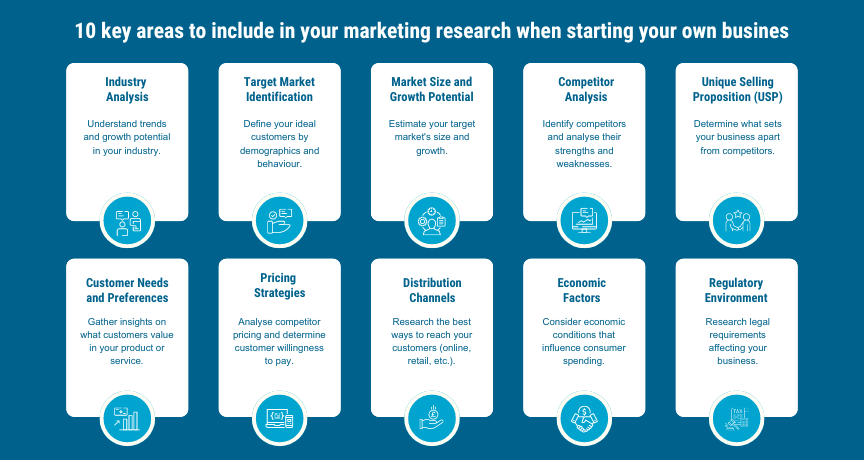
Creating a Solid Business Plan
A detailed business plan is essential for outlining your business strategy and attracting investors.
Key Components of a Business Plan
A comprehensive business plan includes the following key components:
- Executive Summary: A brief overview of your business, its goals, and how you plan to achieve them.
- Market Analysis: An examination of the market conditions, target customers, and competitive landscape.
- Marketing Plan: Strategies for reaching your target audience and promoting your product or service.
- Financial Projections: Detailed forecasts of your business’s financial performance, including revenue, expenses, and profitability.
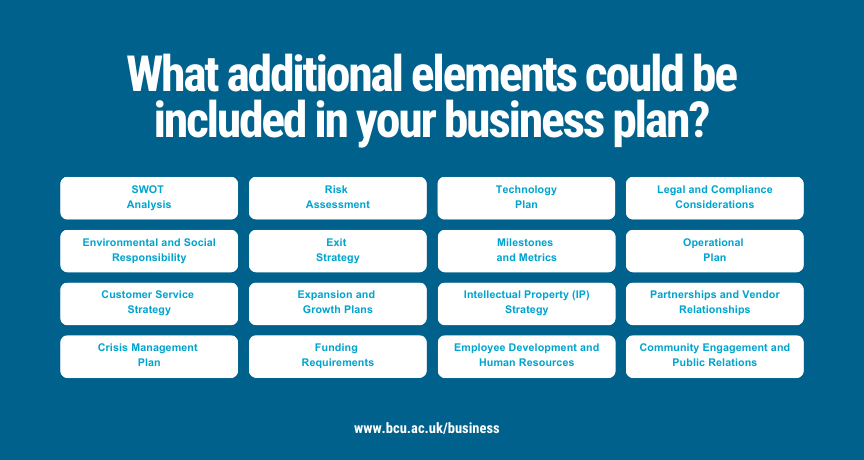
Importance of Setting Clear Goals and Milestones
Setting clear goals and milestones in your business plan helps you track progress and stay focused. It also makes your business more attractive to potential investors, who want to see a clear path to profitability.
A well-crafted business plan can make a significant difference in attracting investors.
For example, the founders of Slack created a detailed business plan that showcased their understanding of the market and their strategy for growth. This clarity and foresight helped them secure substantial funding and grow their business rapidly.
Choosing the Right Business Structure
Selecting the appropriate legal structure for your business is a critical decision that impacts various aspects of your business operation.
Small business owners often face challenges in selecting the appropriate business structure, as it can significantly affect their shipping, marketing strategies, and overall growth.
Pros and Cons of Different Business Structures
- Sole Trader: Simplest structure, offering full control but with unlimited personal liability.
- Limited Liability Company (LLC): Provides personal liability protection, with more complex tax and legal requirements.
- Limited Liability Partnership (LLP): Combines elements of partnerships and corporations, offering flexibility and limited liability.
Impact on Personal Liability, Taxes, and Business Operation
The right business structure affects your personal liability, how you pay taxes, and the overall operation of your business.
Make sure you choose a structure that aligns with your business goals and offers the best balance of protection and flexibility.
Right Structure Can Affect Business Growth
As mentioned, choosing the right business structure can significantly influence your business's growth potential.
For example, an LLP can provide the protection of limited liability while still allowing for a flexible management structure. This can attract investors and partners, ultimately leading to increased growth opportunities for your business.
Additionally, certain business structures may offer tax advantages that can help maximise profits and reinvestment into the business. This is why it is important to carefully consider all aspects of each structure to ensure it aligns with your long-term growth strategy.
Practical Steps to Launch Your Business
Securing Working Capital
Securing the necessary working capital is a crucial step in launching your small business. Without adequate funding, it can be challenging to get your business off the ground.
Funding Options and Financial Planning
- Self-Funding: Using personal savings to finance your business can give you full control but may also put your personal finances at risk.
- Business Loans: Banks and other financial institutions offer loans tailored to small businesses. This option provides significant capital but requires a strong business plan and the ability to repay the loan with interest.
- Seed Funding: Attracting investors or venture capital can provide substantial funds, but you may need to give up some equity or control over your business.
Pros and Cons of Each Funding Option
- Self-Funding: Full control but high personal risk.
- Business Loans: Access to large sums with structured repayment but potential debt burden.
- Seed Funding: Large capital influx with investor expertise but possible dilution of ownership.

Securing Funding for a Start-up
For example, a tech start-up might initially self-fund its development phase, then secure a business loan for operational costs, and finally attract seed funding to scale the business. Each stage of funding plays a crucial role in the start-up's growth.
Setting Up Business Finances
Effective financial management is vital for maintaining your business's health and ensuring its growth.
Importance of Financial Management Tools and Practices
- Opening a Business Bank Account: Separating personal and business finances is essential. A business bank account helps in managing transactions, tracking expenses, and maintaining financial transparency.
- Accounting Software for Small Businesses: Selecting suitable small business accounting software is of upmost importance for maintaining accurate financial records and streamlining business operations. Tools like QuickBooks or Xero can simplify accounting responsibilities by automating invoicing, expense tracking, and financial reporting.
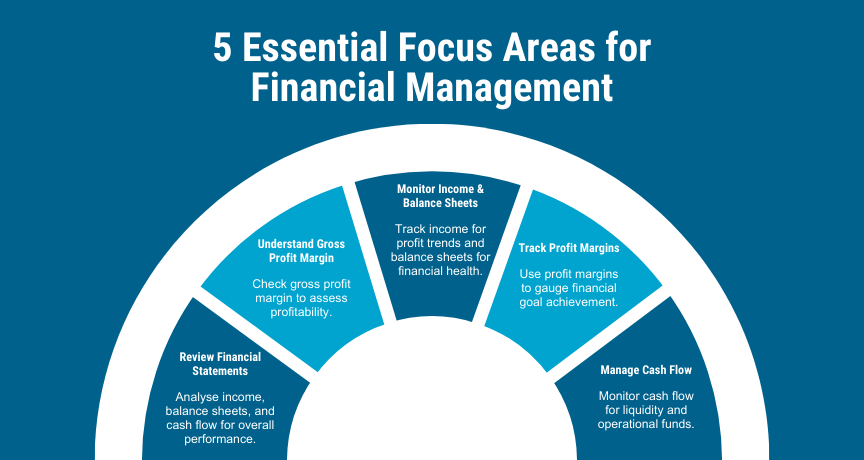
Selecting the Right Business Name
Choosing a memorable and legally sound business name is crucial for brand identity and legal compliance.
Tips on Choosing a Memorable and Legally Sound Business Name
- Considerations for Brand Identity: Your business name should reflect your brand’s values, be easy to remember, and resonate with your target market.
- Legal Restrictions: Ensure the name complies with legal requirements, such as not infringing on existing trademarks and meeting the standards set by regulatory bodies.
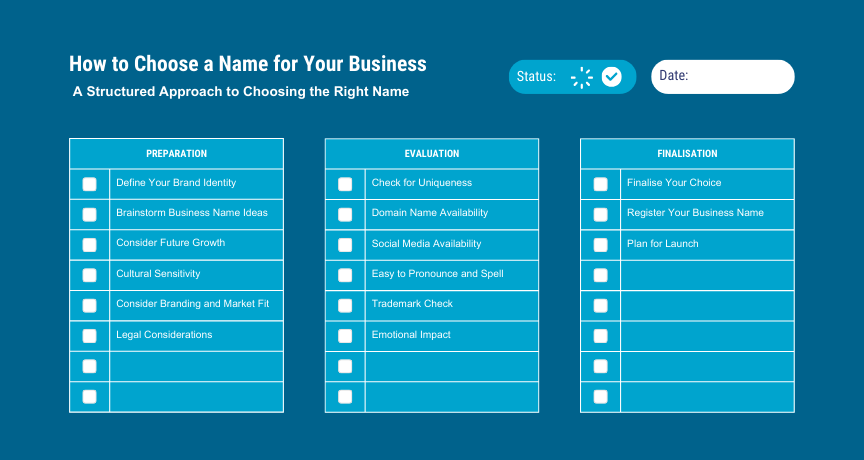
Checking Name Availability and Registering with Companies House
- Name Availability: Conduct thorough research to ensure your chosen name is unique and not already in use. Online tools and databases can help with this step.
- Registering with Companies House: Once you have chosen a name, register it with Companies House to secure your business identity legally.
A Checklist for Naming Your Business
- Ensure the name is easy to spell and pronounce.
- Verify the availability of the name as a domain and on social media platforms.
- Check for any existing trademarks that might conflict with your chosen name.
- Register the name with the appropriate government bodies and regulatory agencies.
Operational Essentials
Establishing Your Business Location
Choosing the right location for your business is critical to your success. Whether you decide to work from home, rent office space, or join a co-working environment, each option has its own set of advantages and considerations.
Office Space Options and Their Implications
- Working from Home:
- Pros: Cost-effective, flexible, and convenient.
- Cons: Potential distractions, isolation, and less professional image.
- Renting Office Space:
- Pros: Professional environment, clear work-life separation, potential for client meetings.
- Cons: Higher costs, long-term lease commitments, and additional overhead.
- Co-working Spaces and Incubators:
- Pros: Flexible terms, networking opportunities, shared resources, and a collaborative environment. Incubators like STEAMhouse offer additional support and mentorship.
- Cons: Less privacy, potential distractions, and shared facilities may not always meet specific needs.
Success Stories of Businesses in Shared Spaces
Many successful businesses have started in co-working spaces.
For example, several tech start-ups initially operated from shared office environments like WeWork and Regus.

Managing Business Processes
Efficient business operations are essential for maintaining productivity and ensuring customer satisfaction.
Implementing streamlined processes and the implementation of appropriate software tools can significantly enhance your business's performance.
Outline Efficient Business Operations
- Streamlined Processes:
- Administration: Automate routine tasks such as invoicing, payroll, and inventory management to reduce manual workload.
- Customer Management: Use Customer Relationship Management (CRM) systems to track interactions, manage leads, and improve customer service.
- Sales: Implement efficient sales processes to manage customer payments, order fulfilment, and follow-ups.
- Software Tools:
- Productivity Tools: Tools like Asana, Trello, or Slack can help manage projects, enhance team communication, and keep track of tasks.
- Communication Tools: Platforms like Zoom, Microsoft Teams, or Google Workspace facilitate seamless communication and collaboration, especially for remote teams.

How Efficient Processes Can Save Time and Money
Consider a small e-commerce business that has implemented an automated inventory management system. This change drastically reduced the time spent on manual inventory checks, minimised errors, and improved order fulfilment speed.
Additionally, using a CRM system helped the business manage customer interactions more effectively, leading to increased customer satisfaction and repeat business.
These efficient processes not only saved time and reduced costs but also contributed to a more scalable and profitable business model.
Marketing and Growth Strategies
Launching Your Marketing Efforts
Effective marketing is crucial for the success and growth of your business. Implementing diverse and strategic marketing efforts can help you reach your target audience and build a strong brand presence.
Strategies for Effective Marketing
- Social Media Platforms: Social media is a powerful tool for engaging with potential customers and promoting your business. Platforms like Facebook, Instagram, Twitter, and LinkedIn allow you to connect with a broad audience, share content, and build brand awareness. Regularly update your social media accounts with relevant content, including posts, stories, and videos. Engage with your followers by responding to comments and messages promptly.

- Email Marketing Campaigns: Email marketing is an effective way to reach your audience directly. Create compelling email campaigns to announce new products, share company news, or offer special promotions. Segment your email list to tailor messages to specific groups, improving engagement and conversion rates.
Importance of a Comprehensive Marketing Plan
A well-structured marketing plan outlines your marketing strategies, target audience, budget, and goals. This plan serves as a roadmap for your marketing efforts, ensuring consistency and alignment with your business objectives.
Engaging with Potential Customers
Building and maintaining strong relationships with your customers is essential for long-term success. Engaged customers are more likely to become repeat buyers and advocates for your brand.
Building and Maintaining Customer Relationships
- Tips for Customer Engagement and Encouraging Repeat Business:
- Personalization: Tailor your interactions to meet individual customer needs and preferences. Personalized emails, product recommendations, and exclusive offers can enhance the customer experience.
- Loyalty Programs: Implement a loyalty program to reward repeat customers. Offer points, discounts, or special perks for frequent purchases.
- Excellent Customer Service: Provide outstanding customer service by being responsive, helpful, and empathetic. Address customer inquiries and issues promptly to build trust and satisfaction.
- Using Feedback to Improve Products or Services: Collect and analyze customer feedback to identify areas for improvement. Use surveys, reviews, and direct customer interactions to gather insights. Implement changes based on feedback to enhance your products or services, showing customers that you value their opinions and are committed to continuous improvement.
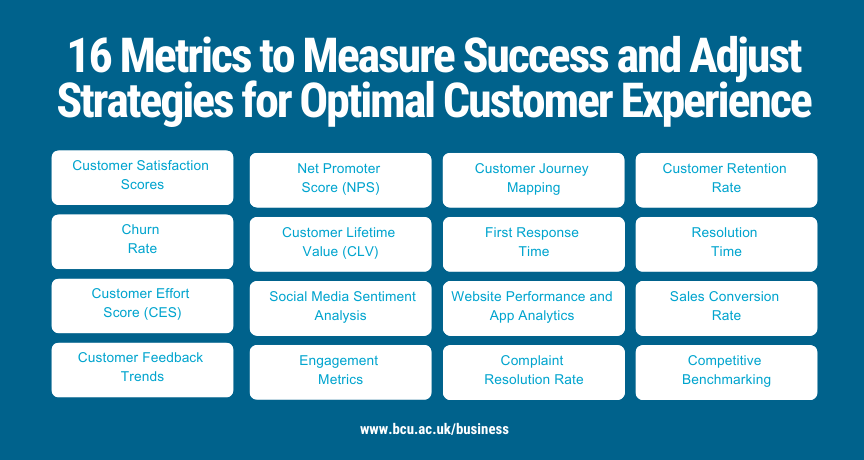
How Customer Engagement Led to Growth in a Start-up
A tech start-up specialising in mobile apps used customer feedback to refine their product. They regularly engaged with users through social media and email surveys, asking for input on features and usability.
Based on the feedback, they made several key updates to their app, improving user experience and functionality.
This customer-centric approach not only led to higher user satisfaction but also drove word-of-mouth referrals and increased downloads, contributing to the start-up's rapid growth.
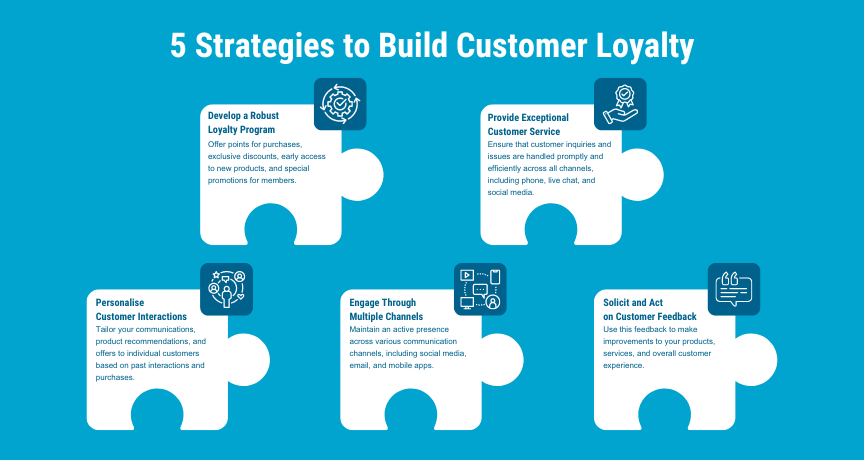
Legal and Compliance Considerations
Meeting Legal Requirements
Navigating the legal landscape is crucial for any new business. Compliance with legal regulations ensures the business operates within the law and minimises risks associated with non-compliance.
Ensuring Compliance with Legal Regulations
- Registering the Business: The first step in meeting legal requirements is to register your business with the appropriate authorities. This process varies depending on the business structure—whether it’s a sole trader, limited company, or partnership. Ensure that all necessary paperwork is completed and submitted to the relevant government agencies, such as Companies House in the UK. Registration legitimizes your business and allows it to operate legally.
- Obtaining Necessary Licenses: Depending on the nature of your business, you may need specific licenses or permits to operate legally. Research the requirements for your industry and locality, and ensure you obtain all necessary licenses before launching your business. For example, businesses in food service, health care, or construction often require specialized permits to comply with industry regulations.
- Paying Taxes: Understanding your tax obligations is essential. Register for the appropriate tax accounts, including income tax, VAT (if applicable), and payroll taxes if you have employees. Maintain accurate financial records to ensure timely tax payments and compliance with reporting requirements.
- Understanding Liability Insurance:
- Public Liability Insurance: This insurance protects your business against claims for injury or damage caused to a third party as a result of your business activities. It is essential for businesses that interact with clients or the public.
- Professional Services Insurance: If your business provides professional services, consider obtaining professional liability insurance. This coverage protects against claims of negligence or errors in your professional services.
Consequences of Non-Compliance and How to Avoid Them
For instance, imagine you own a small service-based business, such as a cleaning or landscaping company. In the excitement of launching your venture, you neglect to properly register your business with the local government and fail to obtain the necessary permits and licenses required for operation. As a result, during a routine inspection by local authorities, they uncover these compliance issues. This could lead to significant consequences, including hefty fines and a temporary suspension of your operations, which can be devastating for a small business.
This scenario highlights the importance of comprehending and following legal obligations to ensure lawful and prosperous operations. Non-compliance with regulations can have detrimental effects on both your business's reputation and financial stability.
In order to steer clear of similar predicaments, it is mandatory for entrepreneurs to diligently investigate their legal responsibilities prior to commencing their venture. It is absolutely essential to have a comprehensive understanding of the licenses, permits, and registrations necessary for your industry and location.
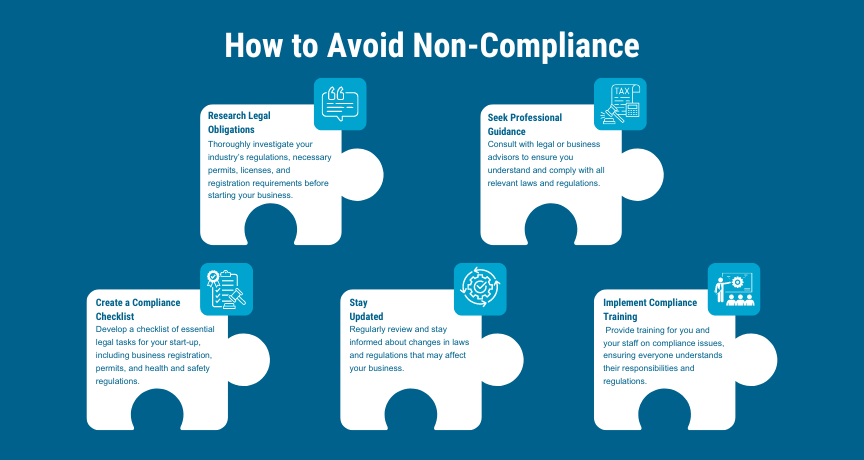
Getting guidance from legal or business consultants can be extremely helpful when it comes to understanding and following all the necessary rules and regulations.
In addition, developing a comprehensive checklist of legal and compliance tasks can be instrumental in avoiding any oversights during the initial stages of the business.
Ensure that your checklist covers essential tasks like registering your business name, acquiring necessary permits and licenses, establishing tax accounts, and familiarising yourself with local health and safety regulations.
Get Your Business Off to a Great Start with BCU
Starting a business can be both an exhilarating and challenging journey, but with the right preparation and knowledge, it can lead to a successful and fulfilling endeavour. By focusing on key steps such as developing a viable business idea, creating a solid business plan, securing funding, and navigating legal requirements, aspiring entrepreneurs can set themselves up for success.
Each phase of the process, from selecting the appropriate business structure to launching effective marketing efforts, plays a vital role in the overall growth and sustainability of the business. With a clear strategy and an understanding of the essentials, anyone can turn their vision into reality.
Now is the time to take that leap of faith and embark on your entrepreneurial journey with confidence. Remember, seeking mentorship and guidance can provide invaluable support and insights as you navigate the complexities of starting a business.
Don’t hesitate to reach out for help, whether from industry experts, fellow entrepreneurs, or supportive networks. Together, let’s turn your business aspirations into a reality!






